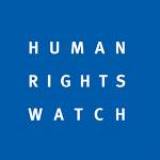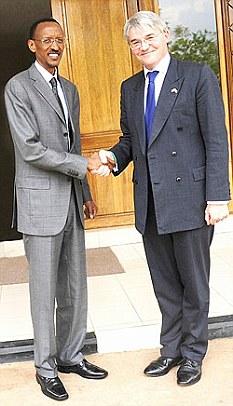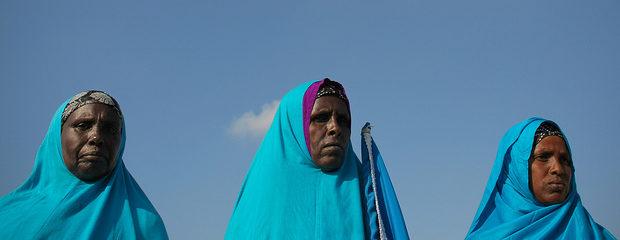Human Rights Watch: UK Policy on Rwanda- Time for a Review – By Carina Tertsakian

 A few weeks ago, a British journalist called me to discuss the human rights situation in Rwanda. We began by talking about the 2010 elections, in which President Paul Kagame was re-elected with 93% of the vote after three opposition parties had been excluded from the race; one opposition leader had been imprisoned; another opposition party member and an independent journalist were murdered; and a prominent government opponent narrowly escaped assassination in exile. After a few minutes, the journalist interrupted me and asked, in a puzzled tone: “Why does our government continue supporting Kagame? What is so special about Rwanda?”
A few weeks ago, a British journalist called me to discuss the human rights situation in Rwanda. We began by talking about the 2010 elections, in which President Paul Kagame was re-elected with 93% of the vote after three opposition parties had been excluded from the race; one opposition leader had been imprisoned; another opposition party member and an independent journalist were murdered; and a prominent government opponent narrowly escaped assassination in exile. After a few minutes, the journalist interrupted me and asked, in a puzzled tone: “Why does our government continue supporting Kagame? What is so special about Rwanda?”
By Carina Tertsakian, 29 July 2011
There is something special about Rwanda: the genocide of 1994, which saw more than half a million people wiped out in three months in a killing campaign orchestrated by Hutu extremists against the Tutsi minority. Seventeen years have passed since the genocide. In many respects, Rwanda has got back on its feet remarkably quickly. The country has made considerable progress against certain development indicators – increased access to health and education services, for example. But there has been much less progress in other areas, in particular political rights, freedom of the press and the rule of law.
At the international level, Western governments are still struggling to come to terms with their collective guilt at failing to stop the genocide. It is hard to know what, if anything, they could do to usefully make up for their shocking inaction in 1994. But turning a blind eye to serious human rights abuses in present-day Rwanda, as well as massacres committed by Rwandan troops in neighbouring Congo – all the while pouring millions of dollars into the Rwandan government budget – is wrong in principle and damaging in practice.
The UK, despite the absence of historical ties to Rwanda, has been first in line. It remains the largest bilateral aid donor to Rwanda, and one of its strongest political supporters. It contributed over £380 million in aid between 1998 and 2008, and has announced an increase in annual spending from around £70 million in 2010-11 to an anticipated £90 million in 2014-15. Rwanda has become of one of its flagship countries for development in Africa. A group of Conservative Party members, headed by Secretary of State for International Development Andrew Mitchell, are currently on their annual “Project Umubano” visit to Rwanda. But while they proudly assist in community projects in front of the television cameras, Rwandan journalists and opposition party members languish in prison for daring to criticise the government.
The UK’s attitude towards Rwanda’s human rights record is based on an artificial and short-sighted analysis. Despite an outward appearance of calm, Rwanda is a fragile country ruled by fear. The deep mistrust resulting from the genocide has been exacerbated by a government which does not tolerate criticism and keeps a close watch on all its citizens – Tutsi as well as Hutu – to ensure that no one is stepping out of line. Rwanda may score highly in terms of some development targets, but can its people really flourish in an environment in which they risk arrest, prolonged detention or, in the worst case scenario, death, simply for speaking their minds? If the UK is genuinely committed to inclusive development in Rwanda, it should use its influence to press for political openness and freedom of speech, and recognise that greater respect for human rights will enhance rather than threaten its development gains.
The gravity of the situation in Rwanda may have finally hit home with British policy-makers in May when two Rwandan nationals living in the UK were warned by the police of credible threats to their security. This, if nothing else, should surely trigger a serious and honest review of UK policy towards Rwanda.
Human Rights Watch has long been calling for such a policy review. In this context we provided evidence to the International Development Committee for its inquiry into the UK Department for International Development (DFID)’s work on the Great Lakes region. Human Rights Watch is not calling for DFID to halt aid to Rwanda, but to attach a much higher priority to human rights – a message in line with DFID’s commitments, at least on paper.
In 2006, the UK and Rwanda signed a ten year memorandum of understanding, which includes explicit commitments on human rights. Yet the UK has remained conspicuously silent when Rwanda has breached these commitments. Similarly, DFID’s operational plan for 2011-2015 talks of dialogue to help open political space and of “the UK’s ability candidly to raise and resolve issues of concern with the [Rwandan] government”. But until its programmes reflect these priorities, these words will be little more than lip-service. Even while using the language of human rights, DFID’s operational plan appears to be making excuses for abuses: “The constraints on rights and freedoms are to some degree explained by Rwanda’s post-genocide context,” it states. This does not bode well for DFID’s resolve to uphold its own commitments towards promoting human rights.
As they weigh up the evidence before them, the members of the International Development Committee may find themselves pondering the same question as the journalist: “Why does our government continue to support this regime so uncritically?” By confronting ministers with the human rights realities in Rwanda, the committee could help trigger that much-needed policy review. The committee could also encourage the UK government to support independent civil society organisations and human rights defenders in Rwanda, many of whom have been ground down by years of threats and intimidation. The re-emergence of a strong, independent domestic human rights movement could be a critical stepping stone towards inclusive development, peace and genuine democracy in Rwanda.
Carina Tertsakian is a Senior Researcher in the Africa Division of Human Rights Watch.
Human Rights Watch’s evidence to the International Development Committee can be found at
http://www.hrw.org/en/news/2011/06/23/submission-uk-international-development-committee-idc






“Human Rights Watch is not calling for DFID to halt aid to Rwanda, but to attach a much higher priority to human rights”
Well hooray! At last an end, apparently, to the HRW policy, pressed with much covert pressure on govts, that ALL Aid must be stopped, that the poorest must suffer, because Rwanda will not do what it is told (by HRW etc).
“a much higher priority to human rights” – err yes, peace, security, health care, education, communications? No that’s not what HRW is interested in. A tabloid press that prints lies? A would be politician with an illegal ethnic platform that wants to divide? The suggestion that if anyone dies in a country of 11m people the govt must be responsible? That HRW and Amnesty know what is best for Rwanda? Yes that is more like it.
Note that there is no evidence that either the politician or the journalist were killed by the govt. Do HRW care about such niceties? Err No. When Igabire’s assistant was arrested this was, said HRW, politically motivated etc etc. When he subsequently confessed in court to killings during the Genocide, did HRW apologise? Of course, not. They clearly did not investigate before making their allegations and feel under no obligation to do so.
Compare with the UK where the tabloid News of the World has been closed after a scandal which has included phone hacking, payments to the police, a political class scared of the media and police force that did not do its job. But was this an attack on the freedom of speech as when lying tabloids were closed in Rwanda? Err HRW has been strangely silent on this. One rule for Rwanda and another for the UK? Well much HRW funding comes from the UK.
Also a journo who spoke out about hacking and paying the Police died recently. Many had cause to be pleased, govt, police, media. But has HRW suggested that the govt must have been responsible? No they have been slient on that too.
Finally, the idea that two “nobody Rwandans” might be at risk in the UK and suggested by the same police force that took money from the press and failed to investigate phone hacking? Not very credible is it? On Saturday another article in the Independent complaining about the UK’s slowness in recognising a Rwandan as a refugee and giving visas to her children but with attacks on Rwanda included. So is that what the Indy articles are all about? Trying to help a few Rwandans with their asylum applications?
It’s a fair issue raised by HRW. For long Dfid are known to talk a certain language that is quite empty of real field experience, lacking emotion and rather clinical in its appreciation of human frailty and falls outside the needed aid segments required against those currently supplied.
“For long Dfid are known to talk a certain language that is quite empty of real field experience, lacking emotion and rather clinical in its appreciation of human frailty and falls outside the needed aid segments required against those currently supplied.”
Andy Wren, sorry but what exactly do you mean by this? This is gobbledegook isn’t it?
“quite empty of real field experience, lacking emotion and rather clinical” I do not know what you mean but by the way isn’t HRW lacking “real field experience” and “emotion”?
The HRW policy that providing development for the poorest – health care, education, reducing malaria and AIDs, roads, communications, initiatives like “one cow per family” – is unimportant is clinical, lacking in emotion and shows they never talk to ordinary Rwandans amongst other things is it not?
No surprise for the HRW article on Rwanda! It has always kept a grudge against the Government of Rwanda for reasons known by HRW itself. At least now for the first time it has recognised some positive progress in Rwanda. We Rwandans we are well pleased by our government for its concerns on the people of Rwanda. It is trying to provide us with social services such education, health, peace and security. And these are the fields that the UK has supported. Rwanda has laws to protect the unity of Rwandans and anything that encroaches the unity of Rwandans (Ingabire et al) should face the law even if the HRW wants otherwise.
The story begins when Carina Tertsakian (the author of the article above) failed to meet requirements for a work visa after Rwanda office of immigration found several irregularities in her application including predated documents and mismatched signatures. It’s is a story of arrogance and perception that as far as you are white from Europe or America you can do anything in Africa without any consequences. Well, she was trying the water and when she found it too deep for trial, she cried foul. Rwanda did not start immigration laws, origins of immigration laws came from the western countries in 1880s to curb influx of immigrants from Southern and Eastern Europe to America. How many immigrants have been deported from her country or Europe for the same illegal status Rwanda deported her for? Who does she think she is to bend the law simply because she comes from developing country? The rest of her bickering is just based on made up stories meant for vengeance to the government that followed its governing laws. Whether you are white or black, or coming from rich or poor country, you need to abide by laws, rest you face the arm of the law. Now she is talking about same rhetoric that alarmist use to get attention from the international community. How many journalists are in Rwanda jails because of the crime of being a journalist? Who is in jail for speaking their minds? My advice to her is to get over it! Grudge minds have never served anyone in this work. Rwanda is peaceful, progressive and Rwandans are happy with their leadership and she needs to live with that!
why waste your time putting inconsistent messages to defend your HRW job.All these stories are so monotonous and boring always talking about a fragile state, STOP THE LIES!!!As you continue to write these articles,so repetitive, some one will doubt your research and potential. Stop the ill articles and come to Rwanda with the right documents to have a better report! Stop this trash and misguidance….
Since she was denied a visa in Rwanda after malpractices as mentioned by Bosco, Carina Tertsakian has taken it personally to tarnish the image of Rwanda. Her boss Roth was also swayed into her plead and threatened Rwanda with negative stories against Rwanda.
As Rwandans, we are not bothered by concocted stories of self proclaimed enemies of our country.
There is a proverb in Kinyarwanda, Iyo ubuze icyo ugaya inka uti dore igicebe cyayo; meaning that those who like to criticise will even criticise a cow with big udder.
Carina has a psychological problem against Rwanda and needs to be assisted.
Two things.
1. Replace “Rwanda”, “Kagame” and ‘genocide’ with “Ethiopia”, “Zanawe” and “famine”, this article would read equally well. Both are African countries that hit rock-bottom and have re-bounded strongly under determined and visionary leaders who take no distraction (criticism) from anyone. Both are also Blair-buddies. Only time will tell whether they and their countries will follow the Icarus-Mugabe model but might it be that at least sometimes crisis states need to hit rock-bottom in order to turn around? Maybe DRC is just too inherently rich ever quite to get there? I don’t know west Africa, but those who know Liberia and Sierra Leone might have a view on this?
2. What a pity that the Rwandan contributors’ feedback on this article largely cannot accept criticism constructively, or even agree to differ in an academic spirit. Sadly this defensiveness reflects a degree of political immaturity that is all too common in Africa, at every level, including President Kagame’s. Rwanda is making great progress in many ways and this is facilitated by the lack of political dissent, but the society (and country) is dangerously brittle in part because this speed is leaving political maturity behind. One crack and Rwanda will shatter in a way that I don’t think plodding Burundi would, because Burundi is (more) inclusive.